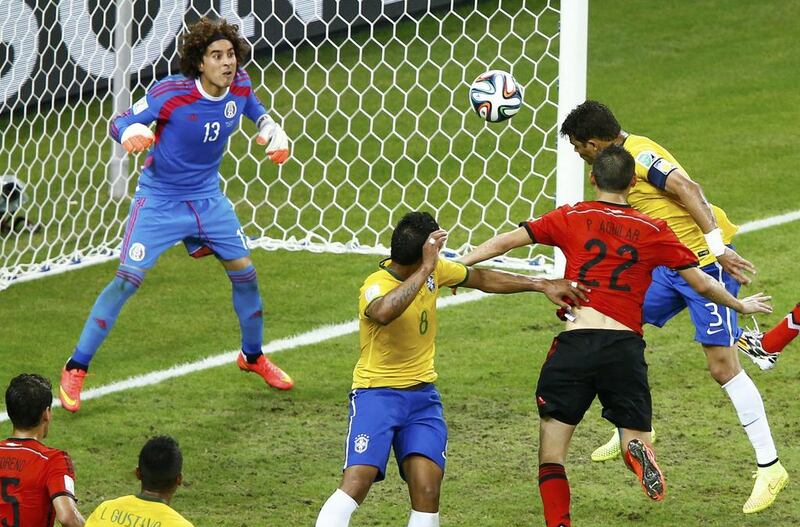Guillermo Ochoa stood, nodding his head, almost in disbelief about the save he had just made. Brazil’s players could scarcely believe it, either.
Having already delivered a Gordon Banks-like save in the first half, Mexico’s goalkeeper had just broken Brazilian hearts and spirits yet again with an astonishing stop on Thiago Silva’s point-blank header toward late in a 0-0 draw on Tuesday.
His save and touching reaction were uncannily similar to that of Liverpool’s Jerzy Dudek, after his double save from AC Milan’s Andrei Shevchenko in the 2005 Uefa Champions League final.
Ochoa’s play was a moment to cherish, perfectly in keeping with a World Cup of surprises.
Halfway through the group stage, the play in Brazil has been an unpredictable joy, on the way to becoming one of the best World Cups in modern times.
The high points are obvious: The brilliant Netherlands’ 5-1 destruction of world champions Spain; Germany’s humiliation of Cristiano Ronaldo and Portugal; Lionel Messi’s brilliant strike against Bosnia and Herzegovina – a solo, team and long-range goal all rolled into one.
And Tim Cahill giving the Dutch a dose of Marco van Basten-style medicine of their own, maybe the competition’s best goal so far. All will certainly make the tournament’s highlights reel.
But beyond these moments, the World Cup has provided so many subtle reminders as to why the world stops for football every four years.
Colombia’s fans raising the roof at the Estadio Mineirao in Belo Horizonte before their match against Greece, setting the standard for supporter delirium for the rest of the tournament.
The elderly Costa Rican fan weeping with joy after his country’s third goal against Uruguay. And Brazil and Chile holding their own stirring, national anthem-singing World Cup. Just imagine if they met in the final.
After the uniformly irritating, vuvuzela-induced drone of South Africa 2010, here are proper football crowds from around the world, in synch with the ebb and flow of the action on the pitch. Living, breathing every shot, counter-attack or save. We will even forgive the occasional Mexican wave.
The feel-good factor has spilled onto the pitch and sportsmanship seems to be reborn. Diving has not exactly been eliminated, but it is certainly less-prevalent than at previous World Cups.
When the England players started dropping from cramps in the heat of Manaus, it was their Italian opponents that helped them stretch their aching limbs. Just what would Diego Maradona’s tormentor-in-chief, Claudio Gentile, think of his successors’ behavior?
Even Fifa deserves credit for the introduction of the disappearing foam at free kicks, at once saving time and making the referee’s life easier.
Neymar, Messi and Andrea Pirlo may have grabbed the headlines, but Brazil 2014 has been a refreshing reminder that heroes can still be made overnight. Only those with a heart of stone could not have been touched by the story of John Brooks.
The German-born American centre-back, 21, came off the bench to score the United States’ late winner against old rivals Ghana in Natal. The look on his face as he was chased by his teammates was one of pure elation.
There have been poignant moments, too. Spain, despite an ignominious exit, should be thanked for service to football from 2008 to 2014.
Cahill was substituted against Holland, after collecting his second booking of the tournament, signalling the last time we will see the Australian legend at a World Cup match.
And Messi unintentionally ignored a poor little mascot’s handshake.
Best of all, Brazil 2014 has been about goals. Plenty of goals. The first 20 matches produced 60 goals, at a rate of three per match, the best production since 1958.
Perhaps managers will become more pragmatic, defences will tighten up and goals will dry up once the knock-out stages begin. But for now, this is football nirvana.
Enjoy it while it lasts.
akhaled@thenational.ae
Follow us on twitter at @SprtNationalUAE





